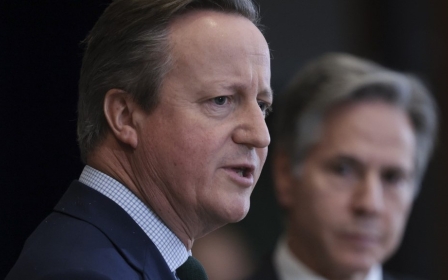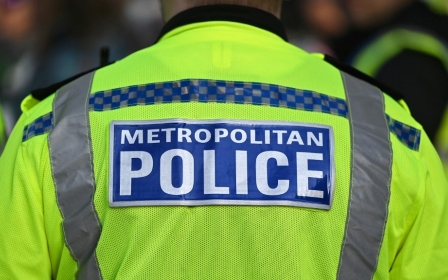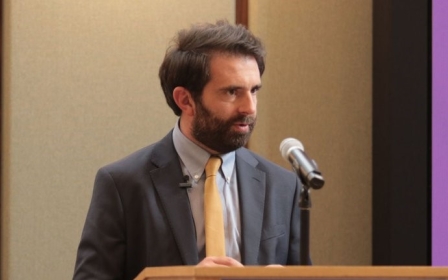Sunak says 'extremists' undermining UK democracy and calls for tougher stance on Gaza protests

UK Prime Minister Rishi Sunak said Islamists and far-right extremists are two sides of the same coin and both pose a threat to British democracy, calling on the police to adopt a tougher stance toward Gaza protests.
In an impromptu speech on Downing Street on Friday, Sunak said the UK's "streets have been hijacked by small groups" that are threatening to "tear us apart".
"We have seen a shocking increase in extremist disruption and criminality. What started as protests on our streets has descended into intimidation, threats, and planned acts of violence," he said.
Earlier this week, Sunak said that there was a "growing consensus that mob rule is replacing democratic rule", in reference to the protests in the UK.
"Jewish children fearful to wear their school uniform, lest it reveal their identity. Muslim women abused in the street for the actions of a terrorist group they have no connection with. Now our democracy itself is a target."
New MEE newsletter: Jerusalem Dispatch
Sign up to get the latest insights and analysis on Israel-Palestine, alongside Turkey Unpacked and other MEE newsletters
He said "this situation has gone on long enough", in reference to protesters, with a direct message that "threats of violence and intimidation are alien to our way of doing things".
'I need to speak to you all this evening because this situation has gone on long enough'
— Sky News (@SkyNews) March 1, 2024
Prime Minister Rishi Sunak addresses the rise in extremism and says 'forces have been trying to tear us apart' since 7 October.https://t.co/xItZsH7tea
📺 Sky 501 and YouTube pic.twitter.com/7hXKOP7wbC
Owen Jones, a British newspaper columnist, said the speech represented a growing wave of authoritarianism in Britain.
He wrote on X, formerly Twitter: "A moral panic is whipped up against dissenting voices, who are portrayed as dangerous extremists who threaten the social order and national unity, and who are fifth columns for foreign enemies.
"The fact is the protests against the mass slaughter of Gaza, and our government's role in arming and supporting it, have been overwhelmingly peaceful. You get more arrests at large football matches. This is a moral panic based on a lie."
Sunak also commented on the recent election of George Galloway, a maverick politician who will return to UK parliament after winning a by-election in Rochdale. Galloway predominantly campaigned on the issue of Israel's war on Gaza, which has killed more than 30,000 Palestinians. The UK government has refused to back a ceasefire, while the opposition Labour Party backed a truce only in recent days.
Representing the Workers Party of Britain, Galloway won almost 40 percent of the votes and nearly 6,000 more votes than his nearest rival in Thursday's poll.
Sunak referenced the victory, saying: "It's beyond alarming that last night, the Rochdale by-election returned a candidate that dismisses the horror of what happened on 7 October, who glorifies Hezbollah and is endorsed by Nick Griffin, the racist former leader of the BNP."
Galloway said he did not understand Sunak's statement on "glorifying Hezbollah" and that he cannot control who endorses him and that he's never met Nick Griffin.
'Social panic' generated by government
Just a few days ago, a coalition of groups, which regularly organises protests to demand a ceasefire in Gaza, told journalists that "divisive rhetoric" by British MPs and "selective media coverage" is driving calls to curb protest rights in Britain.
Pro-Palestine organisations have levelled accusations against British politicians, claiming they are "creating a smokescreen" to shift focus away from demands for a ceasefire in Gaza. This comes as police pressure mounts to limit protests in central London.
Protest groups raised concerns over reports by Middle East Eye that the Community Security Trust was present in special police operations rooms during protests in London calling for a ceasefire in Gaza.
They also accused the Metropolitan Police of using X to "demonise demonstrators, using language that implies they are threatening or dangerous when they are in fact overwhelmingly peaceful and disciplined".
"A social panic is being generated by a government who are avoiding the idea of demanding a ceasefire in Gaza," said Chris Nineham, from the Stop the War Coalition.
"These divisive comments are creating the very tensions that politicians want to avoid because the reality is that the protests are incredibly diverse."
Middle East Eye delivers independent and unrivalled coverage and analysis of the Middle East, North Africa and beyond. To learn more about republishing this content and the associated fees, please fill out this form. More about MEE can be found here.




